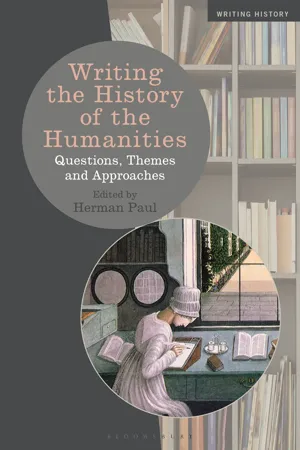
- 392 pages
- English
- ePUB (mobile friendly)
- Available on iOS & Android
About this book
Choice Outstanding Academic Title 2023 What are the humanities? As the cluster of disciplines historically grouped together as "humanities" has grown and diversified to include media studies and digital studies alongside philosophy, art history and musicology to name a few, the need to clearly define the field is pertinent. Herman Paul leads a stellar line-up of esteemed and early-career scholars to provide an overview of the themes, questions and methods that are central to current research on the history of the nineteenth- and twentieth-century humanities. This exciting addition to the successful Writing History series will draw from a wide range of case-studies from diverse fields, as classical philology, art history, and Biblical studies, to provide a state-of-the-art overview of the field. In doing so, this ground-breaking book challenges the rigid distinctions between disciplines and show the variety of prisms through which historians of the humanities study the past.
Frequently asked questions
- Essential is ideal for learners and professionals who enjoy exploring a wide range of subjects. Access the Essential Library with 800,000+ trusted titles and best-sellers across business, personal growth, and the humanities. Includes unlimited reading time and Standard Read Aloud voice.
- Complete: Perfect for advanced learners and researchers needing full, unrestricted access. Unlock 1.4M+ books across hundreds of subjects, including academic and specialized titles. The Complete Plan also includes advanced features like Premium Read Aloud and Research Assistant.
Please note we cannot support devices running on iOS 13 and Android 7 or earlier. Learn more about using the app.
Information
Table of contents
- Cover
- Half-Title Page
- Series Page
- Title Page
- Contents
- List of Illustrations
- Notes on Contributors
- Preface
- Introduction: What is the History of the Humanities?
- Part I Definitions and Backgrounds
- 1 What are the Humanities? A Short History of Concepts and Classifications
- 2 From Philology to the Humanities: Fragmentation and Discipline Formation in the United Kingdom and United States
- 3 The Humanities in Crisis: Comparative Perspectives on a Recurring Motif
- Part II Research Practices
- 4 Modernizing the Comparative Method: Marx and Darwin
- 5 Language and the Mapping of the World: Nineteenth-Century Linguistics in Relation to Ethnology and Geography
- 6 “Big”-ness in Action: Notes from a Lexicon
- 7 Oral History and the (Digital) Humanities
- Part III Values and Virtues
- 8 Practical Learning: The Transnational Career of an Epistemic Value in Japan
- 9 An Ethos of Criticism: Virtues and Vices in Nineteenth-Century Strasbourg
- 10 Producing the Masculine Scholar: Europe in the Nineteenth and Twentieth Centuries
- 11 Scholarly Activism in Africa: The General History of Africa (1964–98)
- Part IV Teaching Practices
- 12 The Humanities in the Vocational University: On the Unity of Teaching and Research
- 13 On the Purpose of Humanities Education: A Historical Perspective from the Mid-Twentieth-Century United States
- Part V Visions of the Future
- 14 The Postcritical Turn: Unraveling the Meaning of “Post” and “Turn”
- 15 Environmental Humanities: Entangled Interdisciplinarity
- 16 Humanities across Time and Space: Four Challenges for a New Discipline
- Glossary
- Index
- Copyright